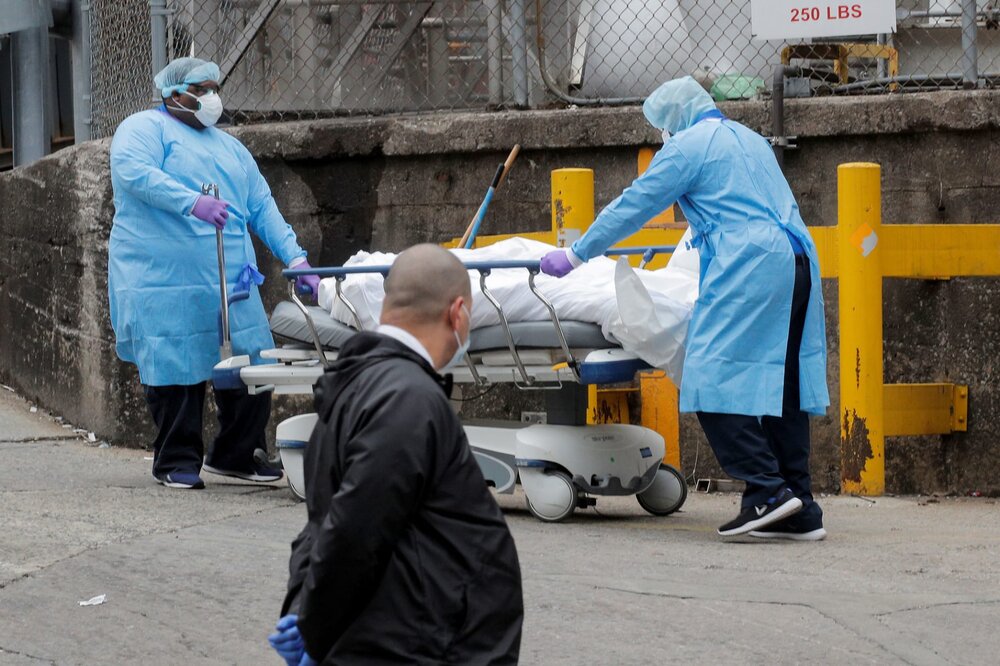Why COVID-19 death toll is so high in New York?

TEHRAN – New York City has been hit so hard by the coronavirus outbreak more than any other city and even some countries around the world, as the number of New Yorkers died of the virus surged to 14,000 on Friday, with a total of 222,000 confirmed cases.
The city's number of infections is even higher than Spain and Italy which previously suffered the highest tolls and also have populations larger than New York.
Out of 34,000 deaths reported in the United States, 42 percent occurred in New York alone, with a death rate of 4.7 percent more than the country's total rate of 3.4 percent and 6 percent above other countries, so that New Yorkers are facing a disproportionate mortality rate due to the pandemic.
Here, the question arises that why New York City is the most haunted by the epidemic?
A combination of factors can be seen in this regard, including population density, less access to medical services for special populations, overwhelmed medical centers, frightened people, high rate of non-communicable diseases, and finally not the issuance of a statewide stay-at-home order until March 22.
Although coronavirus started spreading in other states, New York did not seem to become a place where the pandemic peaks, so it did not whether launched any social distancing plan or issued stay-at-home order until three weeks after transmission and victims were confirmed.
Besides, in early March, some officials in the state were reassuring the people and suggesting they go on with their lives and get out to the town despite coronavirus.
Faced with a disease during which even hours and days matter, any public measure or order may come efficient in breaking the chain of transmission. Early on in an outbreak, the number of cases and deaths can double every few days if protective measures aren’t in place.
Taking the state's population and its density into consideration, the city is the most populous one throughout the country, with a population of 8.2 million which is having the highest density as well, though it is not among the top dense cities in the world especially some Asian countries.
So, being the densest and populated city of the United States might be counted as a reason which drove up the number of people killed. With such close quarters, it seems likely that a virus would spread faster there compared with a rural or even a less-dense city.
Another reason for the elevated mortality rate is overwhelming hospitals across the city, and the inadequate health care given to minorities and the poor throughout New York City, so that black people, in particular, are seeing unequal impacts from COVID-19.
Counties that are majority black, or African American, have three times the rate of infections and nearly six times the death rate for COVID-19 cases than counties that are majority whites. Even in areas with majority whites, blacks often make up a disproportionate number of deaths from COVID-19. About 22 percent of New York City residents are blacks, though 28 percent of COVID-19 fatalities in the city are occurring in that population, according to the state department of health.
That's compared with San Francisco where blacks account for 5 percent of the population, according to the Live Science website.
Some of the blame for sky-high COVID-19 numbers in New York City may also lie with the number of NCD patients especially those suffering from heart attacks, strokes, diabetes and chronic lung disease who might have survived in normal circumstances.
The leading causes of death in New York City are heart disease and cancer, more than nine in 10 deaths in New York City are caused by non-communicable diseases or injuries (87 percent non-communicable diseases), which demonstrates the high prevalence of such diseases which are more vulnerable to COVID-19.
And the last factor may go to limited testing which is mainly focusing on the very-symptomatic people and individuals who require hospitalization. Still, New York as a whole has tested more of the state's population than California has, about 257 per 10,000 individuals compared with 54 per 10,000, respectively, as of April 14.
FB/MG
Leave a Comment